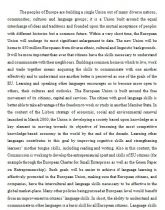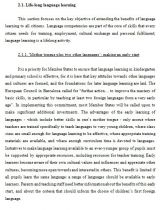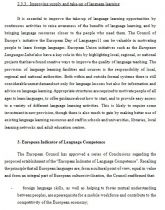Hľadaj
Zobraz:
Univerzity
Kategórie
Rozšírené vyhľadávanie
45 144
projektov
Home » Semestrálna práca » Lisabonská zmluva a jazyky v EÚ - Common european framework for languages and its role from the Lisbon strategy perspective
Lisabonská zmluva a jazyky v EÚ - Common european framework for languages and its role from the Lisbon strategy perspective
| Prípona .doc |
Typ semestrálna práca |
Stiahnuté 4 x |
| Veľkosť 0,2 MB |
Jazyk anglický |
ID projektu 8254 |
| Posledná úprava 09.02.2018 |
Zobrazené 1 704 x |
Autor: - |
 Zdieľaj na Facebooku
Zdieľaj na Facebooku |
||
| Detaily projektu | ||
- cena:
1 Kreditov - kvalita:
92,3% -
Stiahni
- Pridaj na porovnanie
- Univerzita:Ekonomická univerzita v Bratislave
- Fakulta:Fakulta medzinárodných vzťahov
- Kategória:Jazyky » Angličtina
- Predmet:Anglický jazyk
- Študijný program:-
- Ročník:3. ročník
- Formát:MS Office Word (.doc)
- Rozsah A4:17 strán
The peoples of Europe are building a single Union out of many diverse nations, communities, cultures and language groups; it is a Union built around the equal interchange of ideas and traditions and founded upon the mutual acceptance of peoples with different histories but a common future. Within a very short time, the European Union will undergo its most significant enlargement to date. The new Union will be home to 450 million Europeans from diverse ethnic, cultural and linguistic backgrounds. It will be more important than ever that citizens have the skills necessary to understand and communicate with their neighbours. Building a common home in which to live, work and trade together means acquiring the skills to communicate with one another effectively and to understand one another better is perceived as one of the goals of the EU. Learning and speaking other languages encourages us to become more open to others, their cultures and outlooks. The European Union is built around the free movement of its citizens, capital and services. The citizen with good language skills is better able to take advantage of the freedom to work or study in another Member State. In the context of the Lisbon strategy of economic, social and environmental renewal launched in March 2000, the Union is developing a society based upon knowledge as a key element in moving towards its objective of becoming the most competitive knowledge-based economy in the world by the end of the decade. Learning other languages contributes to this goal by improving cognitive skills and strengthening learners’ mother tongue skills, including reading and writing. Also in this context, the Commission is working to develop the entrepreneurial spirit and skills of EU citizens (for example through the European Charter for Small Enterprises as well as the Green Paper on Entrepreneurship). Such goals will be easier to achieve if language learning is effectively promoted in the European Union, making sure that European citizens, and companies, have the intercultural and language skills necessary to be effective in the global market-place. Many other policies being pursued at European level would benefit from an improvement in citizens’ language skills. In short, the ability to understand and communicate in other languages is a basic skill for all European citizens. Language skills are unevenly spread across countries and social groups. The range of foreign languages spoken by Europeans is narrow, being limited mainly to English, French, German, and Spanish. Learning one lingua franca alone is not enough. Every European citizen should have meaningful communicative competence in at least two other languages in addition to his or her mother tongue. This is an ambitious goal, but the progress already made by several Member States shows that it is perfectly attainable. The European Year of Languages 2001 highlighted the many ways of promoting language learning and linguistic diversity. Heads of the State and Government in Barcelona in March 2002 recognised the need for European Union and Member State action to improve language learning; they called for further action to improve the mastery of basic skills, in particular by teaching at least two foreign languages to all from a very early age.
A European Parliament Resolution of 13 December 2001 called for measures to promote language learning and linguistic diversity. On 14 February 2002 the Education Council invited Member States to take concrete steps to promote linguistic diversity and language learning, and invited the European Commission to draw up proposals in these fields. This Action Plan is the European Commission’s response to that request. It should be read in conjunction with the Consultation Document Promoting Language Learning and Linguistic Diversity which sets out the European Commission’s philosophy and the context for the actions proposed.
A European Parliament Resolution of 13 December 2001 called for measures to promote language learning and linguistic diversity. On 14 February 2002 the Education Council invited Member States to take concrete steps to promote linguistic diversity and language learning, and invited the European Commission to draw up proposals in these fields. This Action Plan is the European Commission’s response to that request. It should be read in conjunction with the Consultation Document Promoting Language Learning and Linguistic Diversity which sets out the European Commission’s philosophy and the context for the actions proposed.
Kľúčové slová:
Lisbon
Strategy
Languages
multilingualism
language teaching
jazyky
multijazyčnosť
Obsah:
- Introduction -3-
1. Multilingualism -4-
1.1. Multilingualism and European values -4-
1.2. Multilingualism makes the EU special -5-
2. Foreign language learning within the Lisbon Strategy -5-
2.1. Life-long language learning -7-
2.1.1 'Mother tongue plus two other languages’: making an early start -7-
2.1.2 Language learning in secondary education and training -8-
2.1.3. Language learning in higher education -9-
2.2. Better language teaching -9-
2.2.1. The language-friendly school -9-
2.2.2. The Languages Classroom -9-
2.3. Building a language-friendly environment -10-
2.3.1 An inclusive approach to linguistic diversity -10-
2.3.2. Building language-friendly communities -11-
2.3.3. Improving supply and take-up of language learning -11-
3. European Indicator of Language Competence -12-
Conclusion -14-
Summary in Slovak -15-
Glossary -16-
Sources -17-
Appendix -18-







